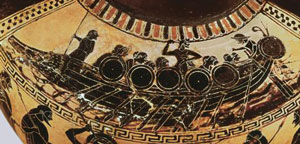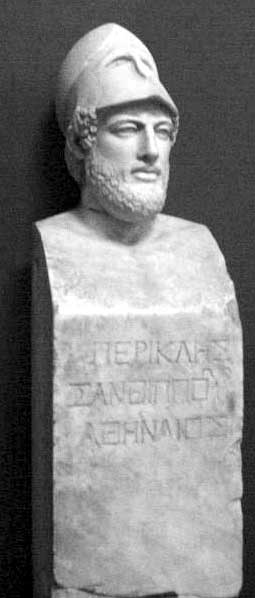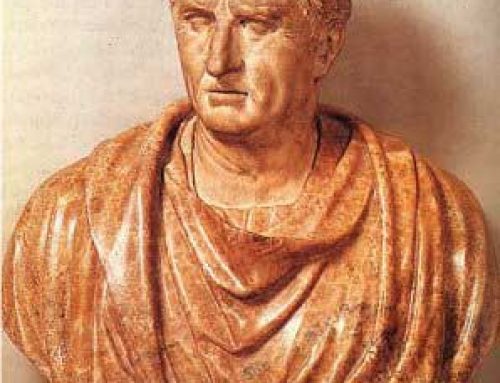
Parthenon, Athens
The Athenian historian Thucydides, who lived through the Peloponnesian War and wrote the history of it, began by asking, why did the war start? He answered that basically the war started because Athens was too greedy, and tried to take over all of Greece. They had taken everybody’s money, and used it to build the Parthenon, and to buy slaves, and to keep from working or paying taxes themselves. So the Spartans decided to stop the Athenians, and help all the cities of Greece become free and independent. The Spartans formed an alliance with Corinth and some other, smaller Greek cities, and brought an army to march to the walls of Athens in 431 BC.

Athenian sailing ship with soldiers
In the first years of the war, it must have seemed pretty hopeless. The Athenians had a lot of money, and a lot of power, and they were the only Greek city that had a good navy. Even though the Spartans could attack the countryside around Athens, the Athenians were safe inside their walls, and the Spartans could not break through. And the Athenians could get food, and come and go as they pleased, by sailing out of their port in their ships. The Spartans didn’t have any navy, so they couldn’t stop the Athenians from sailing around.

Pericles
But in the summer of 430 BC the Athenians began to die from a terrible plague. Because all the Athenian farmers had to leave the countryside and move inside the walls of Athens, it was very crowded inside the walls. A lot of poor people were living in wooden shacks, a lot of people in one room, and with no real protection from the weather, and not enough good food to eat. So it was easy for the plague to spread.
Nobody knows exactly what this plague was. Even though Thucydides described it, it doesn’t sound exactly like any modern disease. Some people think it might be a stronger form of measles. But hundreds of people died. One of the people who died was the Athenian general Pericles, who had been leading the war.
Gradually the Spartans began to win some battles.
Learn by doing: making a shield
Sicilian Expedition (more Peloponnesian War)
Bibliography and further reading about the Peloponnesian War:
Oxford First Ancient History, by Roy Burrell and Peter Connolly (1997). Lively interviews and pictures make the ancient Mediterranean come to life. For teens.
A Brief History of Ancient Greece: Politics, Society, and Culture, by Sarah Pomeroy and others (2004). For college students.
The Peloponnesian War, by Donald Kagan (reprinted 2003). Kagan is basically a military historian, and a conservative. This is a shortened version of his four-volume book about the same war, for the popular reader.
The Peloponnesian War 421-404 BC, by Philip De Souza (2002). A more liberal view, with emphasis on the role played by the Persians, and less on the strategies of individual battles.
The Landmark Thucydides: A Comprehensive Guide to the Peloponnesian War,
by Thucydides, with commentary by Robert B. Strassler (1998). The original account of the war by an Athenian general turned historian.





the peloponnesian war athens is the best
people seen in my life
awsome
In any of the pelopenesian wars were there any particular battles that changed the tides in the war?
Sure! There were several battles that turned the tide of the Peloponnesian War. Read the articles to find them!
Hello I want to know if what caused the transitions between different types of government
Maybe start here: https://quatr.us/greeks/archaic-athens-ancient-greece.htm and click on the link at the end of the article, to read the next one, about tyranny.